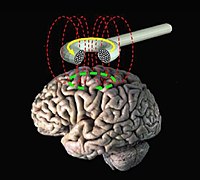
Photo from wikipedia
OBJECTIVE Repetitive transcranial magnetic stimulation (rTMS) is an evidenced based treatment for depression and an emerging treatment for several other neuropsychiatric disorders. The objective of this systematic review was to… Click to show full abstract
OBJECTIVE Repetitive transcranial magnetic stimulation (rTMS) is an evidenced based treatment for depression and an emerging treatment for several other neuropsychiatric disorders. The objective of this systematic review was to assess molecular changes produced by rTMS or molecular markers that predict treatment response in neuropsychiatric disorders. METHODS PubMed, PsycINFO, and Embase were searched through July 2019 for studies published in peer-reviewed journals. Eighty-nine studies were identified examining healthy adults and patients with neuropsychiatric disorders including depression, chronic pain, post-stroke deficits, and movement disorders. RESULTS Our ability to synthesize the information was limited by the large variability in treatment parameters and a limited number of placebo-controlled studies. While few findings were replicated by multiple strong studies, brain derived neurotrophic factor (BDNF) and gamma aminobutyric acid (GABA) in depression, BDNF in post-stroke deficits, and β-endorphin in chronic pain may be altered by rTMS. CONCLUSION BDNF, GABA and β-endorphin were identified as potential molecular markers of rTMS and warrant further exploration. SIGNIFICANCE This study, which is the first systematic review to examine molecular markers of rTMS in both neurological and psychiatric disorders, provides an updated review of this subject and highlight the need for more placebo-controlled and adequately powered studies to identify biomarkers of rTMS.
Journal Title: Clinical Neurophysiology
Year Published: 2021
Link to full text (if available)
Share on Social Media: Sign Up to like & get
recommendations!